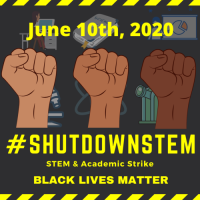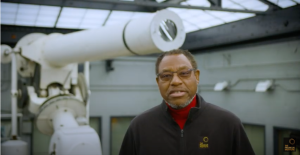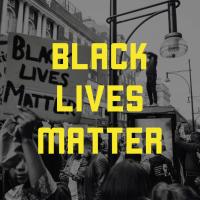On June 10, 2020 #ShutDownSTEM / #ShutDownAcademia organizers called for a halt to "business as usual" to accommodate conversations, learning and reflection on systemic racism in research and academia and to create a plan of action for the future. Learn more:
Many of our partner institutions are going through a process of reflecting on racial justice and how we can all move forward to eliminate racism. Below are some useful resources created by our partners reflecting on race in STEM.
Franklin Institute, Philadelphia, PA - Race and Space videos
In honor of #BlackHistoryMonth, Franklin Institute Chief Astronomer Derrick Pitts spoke with three Black astronomers to discuss the relationship of race and space science.
- Race and Space Part 1 addresses why there are so few black astronomer
https://www.youtube.com/watch?v=_FuMnvAgVzc - Race and Space Part 2 looks at how identity contributes to people's work
https://www.youtube.com/watch?v=dBT2HXKcNiI - Race and Space Part 3 is on how black astronomers survive in their careers
https://www.youtube.com/watch?v=vpYciz4sDoQ
UC Berkeley, CA - Full Spectrum film
Bryan Mendez, UC Berkeley Space Sciences Laboratory Mutliverse produced a documentary short film Full Spectrum featuring interviews with U.S. space scientists who are from underrepresented/marginalized groups. Full Spectrum tells the stories of research scientists and engineers who identify with groups underrepresented in the space sciences in the United States (African Americans, Latinos, Native Americans, Asians, Women, LGBTIQ people, and persons with disabilities). The producers hope that these stories will educate the larger community about challenges that individuals from underrepresented groups face and will spark conversations about how the field of space science, and science in general, can become more inclusive.
Ask anyone in the United States to picture a space scientist, do an internet image search for ‘scientist,’ ‘astronomer,’ or ‘physicist,’ or open up a children’s book about different careers and you will overwhelming get pictures of white men in white lab coats holding flasks of colored liquids. Putting aside the colorful liquids and lab coats, why are they mostly white men?
The truth is, if the average American has ever encountered an actual space scientist they probably were a white man. About 80% of space scientists in the United States are men, and 80% are white.
- Film (20 minutes): http://multiverse.ssl.berkeley.edu/FullSpectrum
- More about the film: http://multiverse.ssl.berkeley.edu/Blog/Full-Spectrum-Documentary-Film-Project-1
Franklin Institute, Philadelphia, PA - What does it mean to talk about racism as a public health crisis?
Biostatistician Dr. Loni Philip Tabb from Drexel University joins Dr. Das to discuss the intersection of race with mental and physical health.
https://www.facebook.com/TheFranklinInstitute/videos/256135918975766/
The Lawrence Hall of Science Pauses for Racial Justice
Learn about how the Lawrence’s staff took a “day of pause” from our work to make an institutional statement against racism and enable staff to take space and/or reflect as needed.
https://www.nisenet.org/blog/post/partner-highlight-lawrence-hall-science-pauses-racial-justice
Racial Justice Resources
If you would like to share with us what your institution is doing, please feel free to contact us






